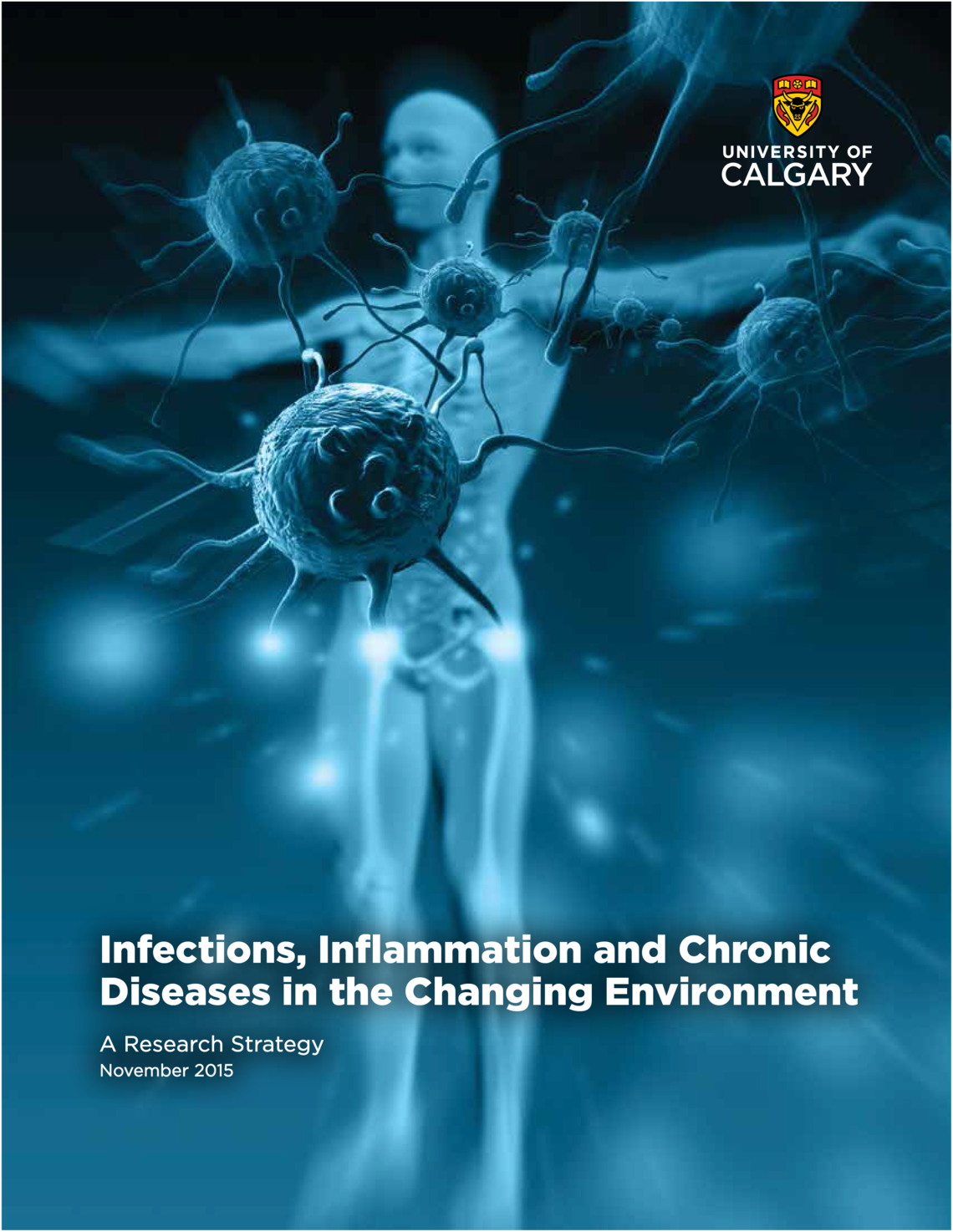Nov. 10, 2015
Improving global health in the changing environment

From left, John Gilleard, Karen Poon, Dr. John Conly, Paul Kubes and Marc Strous.
Riley Brandt, University of Calgary
With today’s launch of the Infections, Inflammation and Chronic Diseases in the Changing Environment (IICD) Research Strategy, the University of Calgary will renew its efforts to address critical challenges to our health and global economy.
Chronic diseases, infections, and inflammatory states — such as asthma, inflammatory bowel disease, and west nile virus — together with pain create the greatest burden on health care in the world, a problem that will only get worse as the number of people over 60 will more than double by 2050.
Many Canadian cities will have an increased number of smog days and intense heat that will affect respiratory and cardiovascular health. The burden of allergens will change, potentially worsening allergic diseases and asthma.
“We have the right researchers, the right combination of research teams, and we are building the right facilities to make discoveries and improve the quality of life for millions of people affected by infections, inflammation and chronic disease,” says Paul Kubes, the IICD theme leader, professor in the Department of Physiology & Pharmacology and director of Snyder Institute for Chronic Diseases. “We will make enormous strides in creating the future of health.”

From left, Karen Poon, PhD, Nicole Perkins, John Gilleard, PhD, Marc Strous, PhD, Paul Kubes, PhD.
Riley Brandt, University of Calgary
University builds on strength of chronic disease research
University of Calgary scholars received four of nine CIHR team grants for chronic disease research in 2015, a true testament to our strength in the field. Dr. Tom Louie of the Cumming School of Medicine was at the forefront of the discovery and clinical translation of microbiome technology to fight C. difficile, which Time magazine declared as one of the top 10 medical breakthroughs of 2013.
The IICD research strategy brings together more than 200 leading experts from across a wide range of fields — from nutritional sciences to geology — bringing a diverse range of perspectives to the problems while also offering rich training opportunities for IICD members.
The IICD research strategy has identified five grand challenges, each with specific and overlapping goals:
- Adapting to a Changing Environment
- Production of Safe and Healthy Food in a Changing World
- Building and Battling Biofilms
- Developing Immunotherapies: Novel Approaches to Treating Infections and Chronic Disease
- Managing the Growing Economic Burden of Chronic Diseases

At the launch event, Paul Kubes speaks about building on research strengths to address challenges.
Exploring the microbiome for better answers to preventing disease
Growing evidence also suggests that many chronic diseases occur as a result of an imbalance between the microbiome and its host. The microbiome — trillions of bacteria, viruses, parasites and fungi that live all around us as well as inside us — may hold the answer to preventing disease and obesity, antibiotic resistance, increasing food production and even finding new sources of energy.
“Every single person on the planet has a unique microbiome,” says Kubes. “These trillions of microorganisms have a crucial role in our health and wellness. The research strategy will help us learn more about how the microbiome protects us from pathogens, cancer, cardiovascular disease and chronic inflammatory disease.”
As part of the strategy, and made possible through $9.9 million in funding from Western Economic Diversification, the university is establishing the Western Canadian Microbiome Centre (WCMC), which will include one of the world’s few large scale multi-user germ-free facilities. This and other state-of-the-art equipment, techniques and technologies will serve as cross-cutting enabling platforms for high impact research outcomes.
In addition to health care, researchers will also explore how interacting microorganisms could increase crop and livestock production, find energy solutions for carbon dioxide conversion and transform biomass into an alternative energy source.

Scientists will lead teams to understand the factors that threaten our health and economies.
Framework will help researchers fine-tune research focus
To guide implementation of the strategy, the IICD team has developed a set of research directives called CONNECT. This framework will help researchers fine-tune the focus of their research to connect our communities with scholars, government, and industry to ensure ongoing and highly impactful knowledge application.
To launch this growth strategy for its highly influential health research programs, the university has partnered with the Gairdner Foundation to host world-renowned scholars with expertise in microbiome research at the national Symposium on the Microbiome. These scholars will be sharing the latest research on the role the microbiome plays in immune development and function during health and disease including infections, inflammation and chronic disease, and fostered discussion around the development of the WCMC.
Through the research strategy for Infections, Inflammation, and Chronic Diseases in the Changing Environment, top scientists will lead multidisciplinary teams to understand and prevent the complex factors that threaten our health and economies.
ABOUT THE UNIVERSITY'S RESEARCH VISION: The University of Calgary is uniquely positioned to find solutions for key global research challenges. The Strategic Research Plan harnesses the university’s exceptional capacity in these areas by focusing on six themes: Energy Innovations for Today and Tomorrow; New Earth-Space Technologies; Infections, Inflammation and Chronic Diseases in the Changing Environment; Human Dynamics in a Changing World; Engineering Solutions for Health; and Brain and Mental Health. Learn more about how the University of Calgary’s Eyes High vision aligns our research resources for the benefit of communities at home and around the world.
